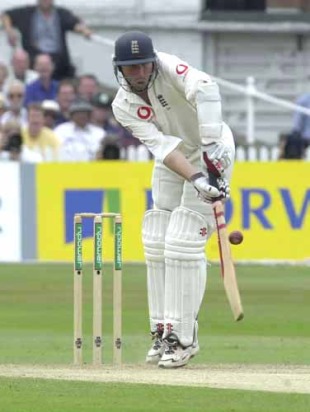If you want to understand sport, you have to understand causes. More accurately, you have to understand how difficult it is to be sure about which causes really influence events, and which are merely irrelevant side issues.
Coaching is about understanding causes: what causes players to perform better? Journalism is about causes: which factors led one team to beat the other? Fans, too, reflect obsessively about causes: what might make the difference for us next season? Sport, like history, is about causes.
And yet understanding causes is incredibly difficult. Causal threads must be observed and disentangled, then weighed and judged. It is much easier simply to assume that easily discernible surface issues - such as selection and short-term tactics - are the primary explanations for why teams win and lose.
That is why the books that have most influenced my thinking about sport address the question of causes rather than sport itself. If I had to name one book that anyone with a serious interest in sport should read, it would be Nassim Taleb's Fooled by Randomness. It scarcely mentions sport, and Taleb actively dislikes organised games. But Fooled by Randomness explores the dangers of sloppy assumptions about causality. It attacks lazy guesses about one thing "leading" to another. It makes the reader re-examine his own flawed reasoning.
Taleb recalls watching the financial markets on Bloomberg TV in December 2003. When Saddam Hussein was captured, the price of US treasury bills went up. The caption on TV explained that this price movement was "due to the capture of Saddam Hussein". Half an hour later, the price of US treasury bills went down. The TV caption explained that this was "due to the capture of Saddam Hussein".
The same "cause" had been invoked to "explain" two opposite effects, which is, obviously, logically impossible.
The next time you absorb sports punditry, keep in mind that story about Bloomberg TV and the price of Treasury bills. You will learn that a golfer misses a crucial putt "because he lost concentration", and then misses the next putt because he was "trying too hard". You will learn that a team loses one match "because they didn't stick to the game plan", then loses the next "because they were unable to think on their feet".
A manager messes up one match "because he was too loyal to his favourite players", then fails in the next "because he unnecessarily alienated the core of the team". And, my favourite: there is always the player who "benefits from utter single-mindedness" one week, and then "suffers from a damaging lack of perspective" the next.
The point, of course, is that causes are being manipulated to fit outcomes. They weren't causes at all, merely things that happened before the defeat. The ancient Romans had an ironic phrase for this terrible logic - post hoc, ergo propter hoc, "after this, therefore because of this".
It is hard to imagine a stronger contender for adopting false causes than the failure of English cricket teams to win the Ashes between 1987 and 2005. This dismal sequence was, apparently, "caused" by the following factors: structure of county cricket, unshaven stubbles worn by some England captains, sticking with a failing core of senior players for too long, introducing too many new players, being insufficiently hard-working and professional, being insufficiently joyful and amateur, having too many counties, being too English, not being English enough. And so on.
Pretty much anything that existed within English cricket, at some point or other, was used to explain England's lack of success in the Ashes. An English cricketer in the 1990s only had to brush his teeth to be told that they didn't do it like that in Australia.
Above all, English cricket failed because it was not like Australian cricket. If only England teams would copy Australian teams by (in no particular order): swearing/caring/sledging/bonding/singing/ drinking/attacking/being mates/taking risks/backing themselves/fronting up/digging in/manning up/playing for the badge/never saying die… if England teams simply did all that, then, frankly, playing Shane Warne's flipper and Glenn McGrath's metronomic seam-up would be a doddle.
| | | |
|
| When your best is not quite good enough, the two levers under your control - selection and tactics - begin to look very inadequate. In other words, they are not really "causes" of defeat at all. They are simply things that happened along the way |
|
| | |
|
Imagine the logical gymnastics required when England started winning Ashes series again. All the previous causes of defeat had now to be converted into explanations for victory. If England's Ashes success continues, it can only be a matter of time until we have the ultimate "Bloomberg moment", when an article is written arguing that Australia routinely loses the Ashes because they have too few state sides and must urgently copy England's first-class structure of 18 counties.
True, some things within English cricket have changed in reality as well as perception: players are now centrally contracted to the England team, for example, rather than to their counties. But not as much has changed as is often claimed. Revolution - "chumps to champs" - is a snappier narrative than gradual evolution.
But the real fun lies elsewhere. It has now become fashionable to scour Australian cricket looking for "causes" of their decline. A few years ago, the personality of Michael Clarke became the focal point for critics of the culture within Australian cricket. When Clarke came good, it was time to look elsewhere for "causes" of muted Australian performances. Ex-players attacked selection as confused, even insulting. Australia, they argued, had to pick more young players, and yet had to pick more players with hard-earned experience; they had to stick with a consistent team while also, inevitably, abandoning obvious mistakes. Sound familiar?
Mike Atherton, the former England captain who received his fair share of criticism during the era of Australian dominance, remarked wryly this week: "It is not quite so easy to be bold, to be consistent or whatever else is deemed topical, when you are losing matches."
The two central variables in sport, the main levers controlled by the management, are selection and tactics. Imagine, for a moment, that you are in charge of the lesser of two teams. You pick what you think is your best XI. And you lose, despite the team playing at or near its potential. If you stick with the same team, are you not merely sleepwalking towards another defeat? And yet if you change it, what has led you to change your mind about the team that you thought was the best XI last week and which, after all, did not really under-perform? Difficult one, isn't it, picking a team that is less good than the opposition?
Now tactics. Imagine you devise what you consider to be your optimal tactical approach. You execute the plan reasonably well. And you lose. Do you change tactics, with the same logic that led you to change the team, or stick with the old tactics that led to defeat?
Very simply, when your best is not quite good enough, the two levers under your control - selection and tactics - begin to look very inadequate. In other words, they are not really "causes" of defeat at all. They are simply things that happened along the way.
It is the same with national economics. Governments and central banks control the familiar levers of interest rates, money supply and taxation. They are endlessly criticised for their handling of all three. But what if the actual economy, the thing itself, is simply not very robust? A rabbit cannot always be conjured magically from a hat.
I would not have explored all this if I wasn't surprised at how often it is forgotten or overlooked in the analysis of sport at every level, from the pub to the board room, and from the commentary box to the armchair. We have long accepted that understanding historical causes is profoundly subtle and intellectually demanding. Exactly the same applies to understanding causes in sport.

